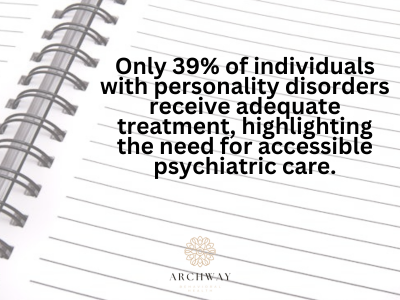Personality disorders are complex and multifaceted mental health conditions that affect an individual’s thoughts, behaviors, and interactions with others. These enduring patterns of behavior and thinking often cause significant distress and impair daily functioning, relationships, and overall well-being. Effective management of personality disorders requires a comprehensive approach that integrates psychiatric care, therapeutic interventions, and structured support systems.
At Archway Behavioral Health, we specialize in helping individuals with personality disorders navigate the path from diagnosis to recovery. By combining Individual Therapy, Group Therapy, Psychiatric Care, and structured programs like the Partial Hospitalization Program (PHP) and Intensive Outpatient Program (IOP), we empower our clients to build healthier coping mechanisms, regulate emotions, and improve relationships. In this blog, we’ll explore the critical role of psychiatric care in managing personality disorders, from accurate diagnosis to achieving long-term recovery.
Understanding Personality Disorders
Personality disorders are a group of mental health conditions characterized by pervasive and inflexible patterns of thinking, feeling, and behaving that deviate from societal norms. These patterns typically emerge in adolescence or early adulthood and significantly impact various aspects of life, including relationships, work, and self-perception.
Types of Personality Disorders
Personality disorders are categorized into three clusters based on shared characteristics:
Cluster A (Odd or Eccentric Behavior):
- Paranoid Personality Disorder: Persistent distrust and suspicion of others.
- Schizoid Personality Disorder: Emotional detachment and limited social interaction.
- Schizotypal Personality Disorder: Eccentric behavior, distorted thinking, and social anxiety.
Cluster B (Dramatic, Emotional, or Erratic Behavior):
- Borderline Personality Disorder (BPD): Intense emotional instability, impulsive behaviors, and fear of abandonment.
- Narcissistic Personality Disorder: Inflated self-importance and need for admiration.
- Antisocial Personality Disorder: Disregard for the rights of others and lack of empathy.
- Histrionic Personality Disorder: Excessive emotional expression and attention-seeking behavior.
Cluster C (Anxious or Fearful Behavior):
- Avoidant Personality Disorder: Social inhibition, hypersensitivity to criticism, and feelings of inadequacy.
- Dependent Personality Disorder: Excessive reliance on others and difficulty making decisions independently.
- Obsessive-Compulsive Personality Disorder (OCPD): Preoccupation with order, perfectionism, and control.
Understanding the type and severity of a personality disorder is the foundation for developing an effective treatment plan.
The Role of Psychiatric Care in Managing Personality Disorders
Psychiatric care is essential in managing personality disorders as it ensures a holistic approach that addresses the emotional, behavioral, and cognitive challenges of these conditions. A psychiatrist’s role involves diagnosing the disorder, managing co-occurring conditions, and providing medication when necessary to stabilize symptoms.
1. Accurate Diagnosis
Accurate diagnosis is the cornerstone of effective treatment for personality disorders. Due to overlapping symptoms with other mental health conditions, personality disorders are often misdiagnosed. For example, mood instability in Borderline Personality Disorder (BPD) might be mistaken for bipolar disorder. A comprehensive psychiatric evaluation is essential to identify the correct diagnosis and create a tailored treatment plan.
- Assessment Process:
- Clinical interviews to explore behavioral patterns and emotional responses.
- Standardized psychological assessments.
- Collaboration with therapists, family members, or caregivers for a complete understanding of the individual’s experiences.
2. Medication Management
While therapy is the primary treatment for personality disorders, medication can play a crucial role in managing co-occurring symptoms such as anxiety, depression, or mood swings. Psychiatrists carefully evaluate the individual’s symptoms to prescribe appropriate medications.
- Types of Medications Used:
- Antidepressants: Help manage symptoms of depression and anxiety, common in individuals with Avoidant or Dependent Personality Disorder.
- Mood Stabilizers: Used to reduce emotional intensity and impulsivity in disorders like BPD.
- Antipsychotics: Address distorted thinking or paranoia in severe cases.
- Example: A client with BPD experiencing intense mood swings and impulsive behaviors may benefit from mood stabilizers to create a foundation for engaging in therapy effectively.
3. Psychotherapy as a Core Component
Psychiatric care goes hand-in-hand with psychotherapy to provide long-term relief from the symptoms of personality disorders. Various evidence-based therapies are used to address the emotional and behavioral aspects of these conditions:
- Individual Therapy:
Clients work one-on-one with a therapist to explore their thoughts, feelings, and behaviors. Techniques such as Cognitive Behavioral Therapy (CBT) and Dialectical Behavior Therapy (DBT) are particularly effective. - Group Therapy:
Group settings provide opportunities to practice interpersonal skills and receive support from peers with similar experiences. - Specialized Therapies:
- Dialectical Behavior Therapy (DBT): Focuses on emotional regulation, mindfulness, and distress tolerance. Widely used for BPD.
- Cognitive Behavioral Therapy (CBT): Helps individuals identify and challenge distorted thought patterns.
- Schema Therapy: Addresses deep-seated beliefs formed in early life that impact current behavior.
Example: A client with Narcissistic Personality Disorder may engage in CBT to develop empathy and challenge unrealistic self-perceptions, improving their relationships.
4. Comprehensive Care Through Structured Programs
At Archway Behavioral Health, our structured treatment programs offer the intensive support needed for recovery. These programs combine psychiatric care with therapy and skill-building activities to provide a holistic approach to treatment.
- Partial Hospitalization Program (PHP):
Designed for individuals requiring intensive support, PHP includes daily therapy sessions, medication management, and skill-building workshops. - Intensive Outpatient Program (IOP):
Offers flexible care for clients who need continued support while balancing work, school, or family responsibilities.
Features of Our Structured Programs:
- Focused sessions on emotional regulation, stress management, and interpersonal skills.
- Regular psychiatric evaluations to monitor progress and adjust treatment plans.
- Integration of holistic therapies like mindfulness and yoga to enhance well-being.
Holistic Approaches to Enhance Psychiatric Care
Holistic care complements traditional psychiatric treatments by addressing the mind-body connection. At Archway Behavioral Health, we integrate holistic therapies to promote emotional balance and overall well-being.
1. Mindfulness and Meditation
Mindfulness techniques help clients stay present, manage stress, and reduce emotional reactivity. These practices are particularly effective for individuals with BPD or Avoidant Personality Disorder.
2. Yoga and Movement Therapy
Physical activity through yoga or movement therapy helps regulate emotions, improve physical health, and boost mood.
3. Nutritional Counseling
A balanced diet supports mental health by providing the nutrients necessary for brain function and emotional stability.
Benefits of Psychiatric Care for Personality Disorders
1. Stabilization of Acute Symptoms
Psychiatric care provides immediate relief from acute symptoms like mood instability, anxiety, or impulsivity through medication and therapy.
2. Improved Emotional Regulation
Clients learn to manage intense emotions more effectively, reducing impulsivity and outbursts.
3. Enhanced Interpersonal Relationships
Through therapy and skill-building, clients develop healthier communication patterns and rebuild relationships.
4. Greater Self-Awareness
Psychiatric care fosters introspection, helping individuals understand the impact of their behaviors and identify areas for growth.
5. Long-Term Recovery
Comprehensive treatment plans, including medication, therapy, and holistic care, ensure sustainable progress and relapse prevention.
Why Choose Archway Behavioral Health?
At Archway Behavioral Health, we are dedicated to helping individuals with personality disorders achieve lasting recovery through compassionate and evidence-based care.
What Sets Us Apart:
- Comprehensive Services: From Individual Therapy to structured programs like PHP and IOP, we provide a full continuum of care.
- Experienced Team: Our psychiatrists and therapists specialize in treating personality disorders using the latest evidence-based approaches.
- Holistic Approach: We integrate traditional and holistic therapies to address the whole person.
- Supportive Environment: Our Mental Health Treatment Center offers a safe and nurturing space for healing.
Conclusion
Managing a personality disorder can be challenging, but with the right care and support, recovery is possible. At Archway Behavioral Health, we provide the tools and resources you need to navigate this journey successfully.
Contact us today to learn more about our services, including Psychiatric Care, Individual Therapy, Group Therapy, and structured programs like PHP and IOP. Together, we can help you achieve emotional stability, improve your relationships, and build a brighter future. Take the step toward reclaiming your life and health—contact us at (888) 488-4103.
FAQ for Psychiatric Care in Managing Personality Disorders
How does psychiatric care help with personality disorders?
Psychiatric care involves accurate diagnosis, medication management, and therapy to address the emotional, behavioral, and cognitive challenges of personality disorders.
What therapies are effective for personality disorders?
Therapies like Dialectical Behavior Therapy (DBT), Cognitive Behavioral Therapy (CBT), and Group Therapy are commonly used to manage symptoms and improve interpersonal relationships.
Is medication necessary for treating personality disorders?
While therapy is the cornerstone of treatment, medication may be used to manage co-occurring symptoms like anxiety, depression, or mood swings.
What programs does Archway Behavioral Health offer for personality disorders?
We offer Individual Therapy, Group Therapy, Partial Hospitalization Program (PHP), and Intensive Outpatient Program (IOP), tailored to each client’s unique needs.
How can holistic therapies complement psychiatric care?
Holistic therapies like mindfulness, yoga, and nutritional counseling can enhance emotional regulation, reduce stress, and support overall well-being.
How long does it take to see improvement?
The timeline varies, but with consistent psychiatric care and therapy, many individuals begin to notice improvements within a few weeks to months.



